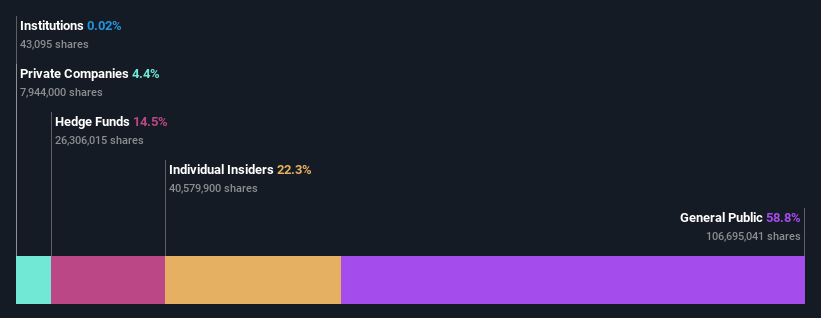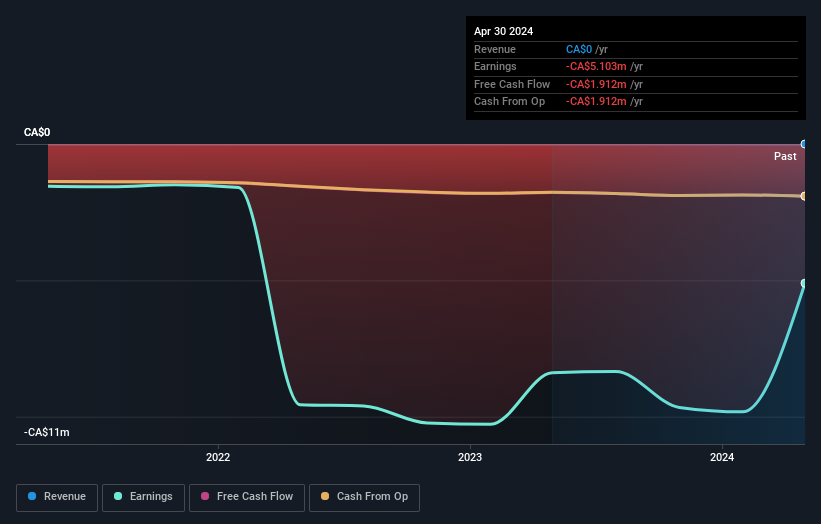- Canada
- /
- Metals and Mining
- /
- TSXV:CAD
Colonial Coal International Corp.'s (CVE:CAD) stock price dropped 13% last week; individual investors would not be happy

Key Insights
- Colonial Coal International's significant individual investors ownership suggests that the key decisions are influenced by shareholders from the larger public
- A total of 8 investors have a majority stake in the company with 41% ownership
- Insider ownership in Colonial Coal International is 22%
If you want to know who really controls Colonial Coal International Corp. (CVE:CAD), then you'll have to look at the makeup of its share registry. With 59% stake, individual investors possess the maximum shares in the company. That is, the group stands to benefit the most if the stock rises (or lose the most if there is a downturn).
Following a 13% decrease in the stock price last week, individual investors suffered the most losses, but insiders who own 22% stock also took a hit.
Let's delve deeper into each type of owner of Colonial Coal International, beginning with the chart below.
Check out our latest analysis for Colonial Coal International

What Does The Lack Of Institutional Ownership Tell Us About Colonial Coal International?
Institutional investors often avoid companies that are too small, too illiquid or too risky for their tastes. But it's unusual to see larger companies without any institutional investors.
There are many reasons why a company might not have any institutions on the share registry. It may be hard for institutions to buy large amounts of shares, if liquidity (the amount of shares traded each day) is low. If the company has not needed to raise capital, institutions might lack the opportunity to build a position. Alternatively, there might be something about the company that has kept institutional investors away. Institutional investors may not find the historic growth of the business impressive, or there might be other factors at play. You can see the past revenue performance of Colonial Coal International, for yourself, below.

Our data indicates that hedge funds own 14% of Colonial Coal International. That catches my attention because hedge funds sometimes try to influence management, or bring about changes that will create near term value for shareholders. Rosseau Asset Management Ltd. is currently the largest shareholder, with 14% of shares outstanding. In comparison, the second and third largest shareholders hold about 11% and 7.4% of the stock. David Austin, who is the second-largest shareholder, also happens to hold the title of Chief Executive Officer.
Our studies suggest that the top 8 shareholders collectively control less than half of the company's shares, meaning that the company's shares are widely disseminated and there is no dominant shareholder.
Researching institutional ownership is a good way to gauge and filter a stock's expected performance. The same can be achieved by studying analyst sentiments. As far as we can tell there isn't analyst coverage of the company, so it is probably flying under the radar.
Insider Ownership Of Colonial Coal International
The definition of company insiders can be subjective and does vary between jurisdictions. Our data reflects individual insiders, capturing board members at the very least. The company management answer to the board and the latter should represent the interests of shareholders. Notably, sometimes top-level managers are on the board themselves.
Insider ownership is positive when it signals leadership are thinking like the true owners of the company. However, high insider ownership can also give immense power to a small group within the company. This can be negative in some circumstances.
Our most recent data indicates that insiders own a reasonable proportion of Colonial Coal International Corp.. It has a market capitalization of just CA$436m, and insiders have CA$97m worth of shares in their own names. It is great to see insiders so invested in the business. It might be worth checking if those insiders have been buying recently.
General Public Ownership
The general public, who are usually individual investors, hold a substantial 59% stake in Colonial Coal International, suggesting it is a fairly popular stock. With this amount of ownership, retail investors can collectively play a role in decisions that affect shareholder returns, such as dividend policies and the appointment of directors. They can also exercise the power to vote on acquisitions or mergers that may not improve profitability.
Private Company Ownership
Our data indicates that Private Companies hold 4.4%, of the company's shares. It's hard to draw any conclusions from this fact alone, so its worth looking into who owns those private companies. Sometimes insiders or other related parties have an interest in shares in a public company through a separate private company.
Next Steps:
It's always worth thinking about the different groups who own shares in a company. But to understand Colonial Coal International better, we need to consider many other factors. Case in point: We've spotted 2 warning signs for Colonial Coal International you should be aware of.
If you would prefer check out another company -- one with potentially superior financials -- then do not miss this free list of interesting companies, backed by strong financial data.
NB: Figures in this article are calculated using data from the last twelve months, which refer to the 12-month period ending on the last date of the month the financial statement is dated. This may not be consistent with full year annual report figures.
New: AI Stock Screener & Alerts
Our new AI Stock Screener scans the market every day to uncover opportunities.
• Dividend Powerhouses (3%+ Yield)
• Undervalued Small Caps with Insider Buying
• High growth Tech and AI Companies
Or build your own from over 50 metrics.
Have feedback on this article? Concerned about the content? Get in touch with us directly. Alternatively, email editorial-team (at) simplywallst.com.
This article by Simply Wall St is general in nature. We provide commentary based on historical data and analyst forecasts only using an unbiased methodology and our articles are not intended to be financial advice. It does not constitute a recommendation to buy or sell any stock, and does not take account of your objectives, or your financial situation. We aim to bring you long-term focused analysis driven by fundamental data. Note that our analysis may not factor in the latest price-sensitive company announcements or qualitative material. Simply Wall St has no position in any stocks mentioned.
About TSXV:CAD
Colonial Coal International
Engages in the acquisition, exploration, and development of coal properties in Canada.
Flawless balance sheet very low.
Market Insights
Community Narratives



